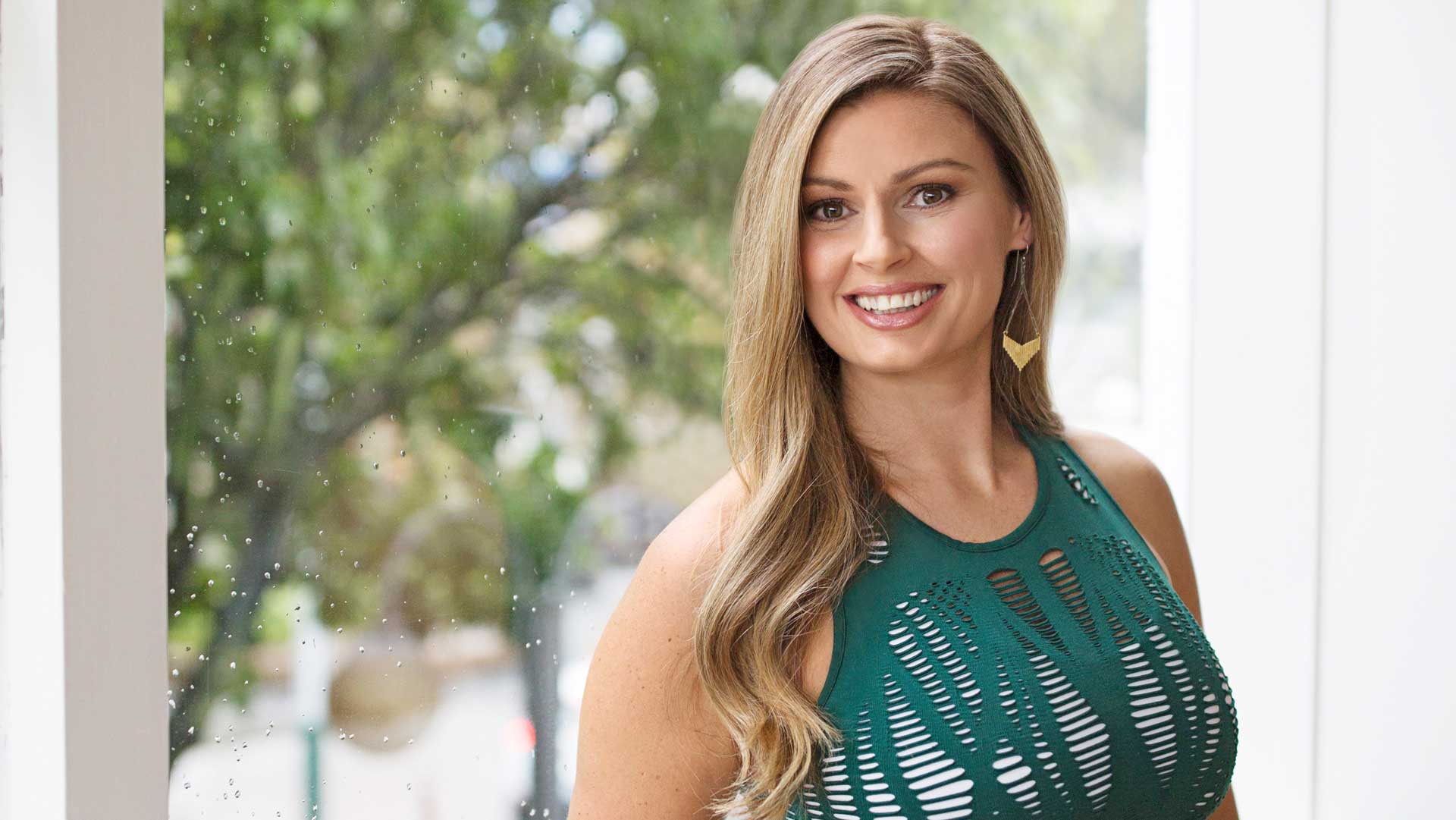Bridget Bennie will never forget her daughter’s first birthday.
A day reserved for celebrating an important milestone was turned on its head when she was told that she had stage three bowel cancer.
The 34-year-old mother-of-two says the cancer diagnosis came as a shock despite the fact she’d been experiencing problems with her bowel.
“It was heart-breaking news. My world was rocked,” says Bridget.
“The blood in my stool started after my daughter was born. I remember having a conversation with a friend when I came back from the toilet for the third time during our lunch. I said, ‘The bleeding only starts after my fifth or sixth poo of the day; I normally do about 10 a day.’ I still remember the look of horror on her face.”
After almost a year of feeling unwell and irregular bowel habits, Bridget, a primary school teacher, says she finally decided to seek the opinion of her GP. She was given a referral for a colonoscopy, but told that the bleeding was most likely haemorrhoids.
“I didn’t go for my colonoscopy straight away after getting the referral. I waited a few months,” recalls Bridget.
“I had breastfed my son until his first birthday and I was determined to do that for my daughter too. I didn’t want the anaesthetic to affect my milk flow.”

After almost a year of feeling unwell and experiencing irregular bowel habits, Bridget decided to seek the opinion of her GP.
Looking back, Bridget knows that the delay could have had devastating consequences.
“I thought what I was experiencing was normal and I was too embarrassed to be completely honest about my toileting,” she recalls. “Imagine if I’d had the courage to do that even a few months prior.”
Since her diagnosis, Bridget has undergone surgery and aggressive treatment.
“It started with a resection of my bowel to remove the cancer and surrounding lymph nodes. I also had an ileostomy [a surgical opening to move waste out of the body] formed in this surgery,” she says.
“I then started the first of 12 rounds of chemotherapy.”
Bridget is now in remission and says her prognosis is good. “I’ll be monitored closely by my colorectal surgeon and oncologist for the next five years. Hopefully this will eliminate any recurrence of cancer.”
Ainslie Mackay was also in her 30s when she was diagnosed with stage three bowel cancer.
The then 37-year-old mother-of-two says she was in the best shape of her life, but was experiencing hair loss and shortness of breath when walking up stairs.
“I went to a local GP and she ordered tests and diagnosed PCOS without any hard evidence,” she says.
“I was upset with this diagnosis and because I was upset, she diagnosed me as depressed and sent me on my way with a script for antidepressants, which I never took. The very next day I found a new GP. He diagnosed low iron, which can cause hair to fall out.”
Ainslie, now 38, said it was then that she mentioned to her doctor that she occasionally noticed blood in her stool.
“He ordered a colonoscopy and found the tumour.”
The tumour was already seven centimetres, so doctors needed to act quickly. “My cancer was classed as stage three as it had spread to the neighbouring lymph nodes,” says Ainslie.
“I had surgery to remove one third of my bowel, had an ileostomy placed to allow my bowel to heal and spent eight days in hospital.”
Like Bridget, Ainslie also needed to undergo 12 rounds of chemotherapy.
“I think by this stage, nothing surprised me. I was just rolling with the punches and doing what I had to do to get better and live life with my children.”
Three months out from finishing chemotherapy, life is beginning to return to normal for Ainslie.
“I feel pretty good. It almost feels like it happened to someone else and I watched on, although I do have some ongoing issues with my hands and feet as an effect of the chemo.”
Ainslie is now encouraging anyone to get checked if you’re experiencing symptoms.
“You know your own body and have a sixth sense to know when something is not right. Don’t ignore it. Get a second, third or fourth opinion,” she says.
“It took many years and the third doctor to diagnose me. Bowel cancer is not an old man’s disease – you’re never too young, fit or healthy.”

Ainslie is encouraging anyone to get checked if you’re experiencing symptoms.
According to Associate Professor Graham Newstead, a colorectal surgeon and director at Bowel Cancer Australia, there is a misconception in the community that bowel cancer only affects older people.
“When I was a medical student, bowel cancer was a disease for people well into their 50s, 60s, 70s and 80s, but today we’re increasingly seeing younger people with the disease,” he explains.
“Although the disease is more common in people over 50, you’re never too young to have bowel cancer. If you have a family history of the disease, you also need to talk to your GP.”
In New Zealand, about 300 people under 50 are diagnosed with bowel cancer each year. Associate Professor Newstead says a sedentary lifestyle is likely to be a contributing factor.
“Bowel cancer is closely linked with diet, which has changed so significantly in recent years, and possibly lack of physical activity, which could explain the rising rates in young people,” he says.
“The risk of bowel cancer increases if you lead a sedentary lifestyle, rely on processed or packaged foods and/or have diabetes or obesity, so it’s not surprising that we’re now starting to see the full impact of diet and lifestyle in the younger generation.”
There’s also concern about people consuming a high amount of processed meat, which the World Health Organisation linked to bowel cancer.
The good news is that 98 per cent of bowel cancer cases can be treated if detected early.
“It’s important for people to know their own bodies and recognise when something isn’t normal,” says Associate Professor Newstead.
“Symptoms suggestive of bowel cancer should be followed up with a colonoscopy within 30 days to rule out anything more sinister.
Medical guidelines recommend people at average risk of bowel cancer screen using a faecal immunochemical test (FIT) every two years from age 50. It’s free through the National Bowel Screening Programme (NBSP) for men and women aged 60 to 74. The NBSP is being rolled out gradually across the country. For more see www.health.govt.nz.
What is bowel cancer?

Bowel cancer, also known as colorectal cancer, develops in the lining of the bowel. It begins when cells grow too quickly, forming a clump known as a polyp.
Although most are benign (non-cancerous), some can become cancerous and if left untreated, the cancer can spread and become invasive.
Signs and symptoms to watch out for:
A recent, persistent change in your bowel habits.
A change in the shape or appearance of bowel movements.
Blood in the stool or rectal bleeding.
Frequent gas, pain and cramps.
A feeling that the bowel has not emptied completely after a bowel movement.
Unexplained anaemia. You may experience tiredness, weakness or weight loss.
Rectal/anal pain or a lump in the rectum/anus.
Abdominal pain or swelling.




